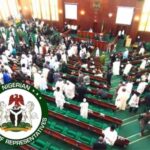Activities of illegal oil bunkers in the upstream oil sector undermining the nation’s foreign earnings were discussed on the floor of the Senate on Tuesday, with the Red Chamber ordering a thorough investigation into the actions of security forces and militia groups using sophisticated methods to steal crude oil in the country.
The resolution of the Senate was a sequel to a motion by Senator representing Delta North, Ned Nwoko, who declared, giving statistical data, that pipeline vandalism and illegal oil bunkering constitute serious encumbrance to Nigeria’s capacity to get out of its present economic doldrums.
Presenting his motion, the lawmaker argued that Nigeria has lost about N2.3 trillion expected from its hydrocarbon reserves this year.
Senator Nwoko alleged that security agencies connected with certain oil industry operators, were behind the oil theft.
He said, “The current collaborative efforts involving the Joint Task Force of the Nigerian military, operations like Operation Delta Safe and Operation Dakartada Barawo, along with the contributions of various security entities, state and local governments, and International Oil Companies (IOCs) in the Niger Delta region have yielded positive results.
“These efforts have increased oil production, reaching 1.51 million barrels per day in the first quarter of 2023. This figure marks an improvement from the 1.49 million barrels per day recorded in the same quarter of 2022 and is notably higher than the production volume of 1.34 million barrels per day in the fourth quarter of 2022.
“Despite the efforts of certain military personnel and security agencies like the Nigeria Security and Civil Defense Corps (NSCDC) and Department of State Services (DSS) in combating oil theft in the Niger Delta region, there are individuals within these institutions who engage in illicit activities.
“These individuals collaborate with unscrupulous figures within the oil industry to undermine the nation’s economy.
“Also observes that it has come to attention that oil theft in Nigeria thrives due to a troubling collaboration between security forces, militia groups, the local population, and certain employees within oil companies.
“These parties employ sophisticated methods to carry out theft from oil facilities located within the country. Given Nigeria’s vast oil and gas reserves, one would expect crude oil production to increase continuously, aligning with OPEC’s production quota of 1.74 million barrels daily.”
Senator Nwoko pointed fingers of scorn in the direction of local militia and security agencies which he maintained was a serious setback to efforts to meet set economic targets.
“In 2022, it was reported that Nigeria suffered daily losses of approximately 437,000 barrels of crude oil, amounting to a value of $23 million, due to criminal activities.
“In March 2023, Nigeria incurred a substantial loss of 65.7 million barrels of crude oil, valued at $83 per barrel, translating to a staggering revenue loss of N2.3 trillion as a result of oil theft.”
In his contribution, the Senator representing Oyo North, Buhari Abdulfatai, demanded for proactive measures to mitigate illegal oil bunkering.
“We carry out investigations every year but at the end, nothing has come out of it. We need to review our laws and take punitive measures against oil thieves.”
Senator Adams Oshiomhole said oil theft was an organised crime involving the bunkerers and the security operatives.
This, he said, explained why many security agents lobbied their superiors to be posted to the oil producing communities.
The Senate, consequently mandated its committees on Petroleum Resources (Upstream, Downstream and Gas), Host Communities and Niger Delta Affairs) to carry out holistic investigation into the actions of security forces, militia groups, the locals, oil company employees and any individual or entity suspected to be using sophisticated methods to pilfer from oil facilities.
President of the Senate, Godswill Akpabio in his concluding remarks asked the relevant Committees to carry out diligent investigations and report back to the Senate in six weeks.
READ ALSO FROM NIGERIAN TRIBUNE






